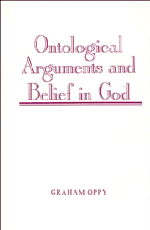Book contents
- Frontmatter
- Contents
- Preface
- Acknowledgments
- Ontological arguments and belief in God
- Introduction
- 1 Some historical considerations
- 2 Definitional arguments
- 3 Conceptual arguments
- 4 Modal arguments
- 5 Meinongian arguments
- 6 Experiential arguments
- 7 “Hegelian” arguments
- 8 Application to historical arguments
- 9 Are there (other) global objections to ontological arguments?
- 10 Is existence a predicate?
- 11 The uses of parody
- 12 Are ontological arguments of any use to theists and/or atheists?
- Conclusion
- Literature notes
- Bibliography
- Index
9 - Are there (other) global objections to ontological arguments?
Published online by Cambridge University Press: 05 May 2010
- Frontmatter
- Contents
- Preface
- Acknowledgments
- Ontological arguments and belief in God
- Introduction
- 1 Some historical considerations
- 2 Definitional arguments
- 3 Conceptual arguments
- 4 Modal arguments
- 5 Meinongian arguments
- 6 Experiential arguments
- 7 “Hegelian” arguments
- 8 Application to historical arguments
- 9 Are there (other) global objections to ontological arguments?
- 10 Is existence a predicate?
- 11 The uses of parody
- 12 Are ontological arguments of any use to theists and/or atheists?
- Conclusion
- Literature notes
- Bibliography
- Index
Summary
At the end of the preceding chapter, I concluded that there is a global objection to ontological arguments - that is, an objection that suggests in advance that no ontological argument can be dialectically effective. It is important to emphasize that it is not part of this objection to claim that no ontological argument can be sound. For all that I have said, it may be that there are sound versions of all ontological arguments.
Other philosophers have thought that it is possible to show in a single stroke, once and for all, either (i) that no ontological arguments can be sound or else (ii) that no ontological arguments can be thought to be sound on a priori grounds. In this chapter, I shall consider several such attempts. Of course, I have already argued that the Humean, Kantian, and logical positivist attempts to carry out this project fail. I shall not repeat those arguments in this chapter. Moreover, I shall hold over discussion of the claim that existence is not a predicate until the following chapter.
THE MISSING EXPLANATION ARGUMENT
The following line of argument is adapted from a more general argument in Johnston (1992). It is intended to establish that there could not be an ontological argument that provides anyone with a good reason to believe that God exists - that is, there could not be an ontological argument that could reasonably be taken to be sound on a priori grounds.
- Type
- Chapter
- Information
- Ontological Arguments and Belief in God , pp. 119 - 129Publisher: Cambridge University PressPrint publication year: 1996



